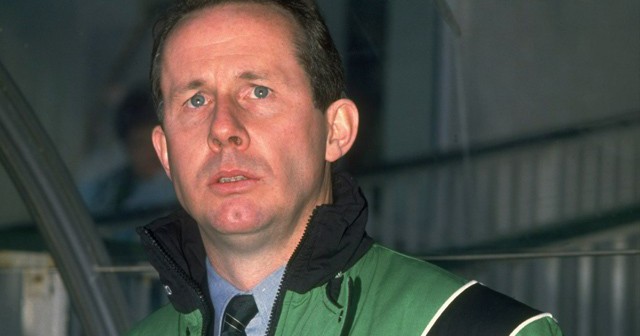LIAM BRADY was named as Billy McNeill’s successor as Celtic manager in June 1991.
The charismatic Irishman arrived with a dream for the club, but his vision had become blurred by the time he departed in early October 1993.
In another CQN EXCLUSIVE series, author Alex Gordon opens his book files to look back at an intriguing and compelling chapter in the club’s history.
Here is another edited extract from Alex’s tribute book, ‘The Winds of Change‘, published by CQN in 2015.
Please enjoy.
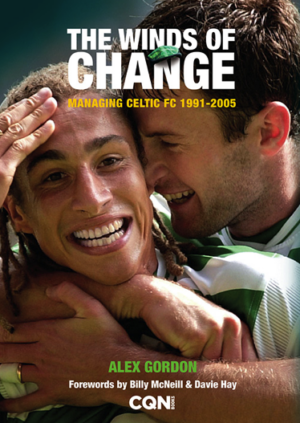
ON THE Saturday after the Ibrox flop, a solitary goal from John Robertson gave Hearts a win over a poor and clueless Celtic, the club’s second league defeat of the season.
Photographs of Brady, grimacing as he watched his team stumble, were appearing on back pages of every newspaper. The pressure was unyielding. A week later, the Celtic players were serenaded with boos, jeers and cat-calls at the interval and full-time after another hapless performance, this time a goalless draw against Kilmarnock at Parkhead.
Brady said, ‘The fans gave us pelters and we deserved pelters. That’s the second league game on the trot we have played really, really badly.’
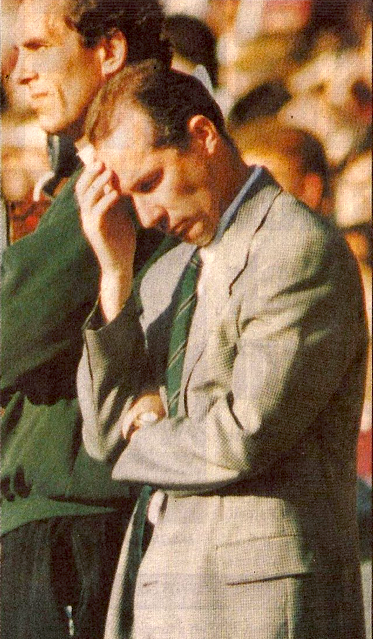
HEARTACHE…Liam Brady, accompanied on the Tynecastle touchline with Joe Jordan, can’t bear to watch as Celtic lose 1-0 to Hearts.
It wasn’t to get much better. In midweek, Celtic lost 2-1 to St Johnstone, who would eventually be relegated, and once again a cacophony of wailing disappointment spilled from the terracings from a support who had reached breaking point. A dejected Brady, sitting on the touchline with his head buried into his hands, knew the end of his Celtic managerial career was near. In fact, it was only an hour or so away.
The Perth defeat left the club ninth in the twelve-team Premier League. Celtic had picked up nine points from a possible twenty after ten games. They had claimed only two wins – both away from home – had lost three and drawn five. They had scored ten goals and conceded nine.
However, it is worth looking at what was happening at Ibrox over the same period because Rangers were not racing away at the top. Far from it. They were a mere point better off than Celtic and had won three, lost three and drawn four with eleven goals scored and twelve conceded.
Aberdeen, who had finished as runners-up the previous season, had amassed thirteen points after four wins, one defeat and five draws. So, despite an awful opening to the campaign, no-one could write off Celtic at that stage.
Brady, as studious a character as I’ve ever met in football, wouldn’t have made up his mind in the spur of the moment to leave Celtic. Instinctively, though, he knew it was time to go. His resignation filtered through to the Press the following morning.
A statement, apparently from the exiting manager, stated, ‘After recent results and performances, I have decided to resign. A tremendous pressure surrounds the club at the moment – the management staff, players, board and supporters alike. It is my responsibility as manager that this should not affect the players. I have not been able to do this. I have taken the decision to stand down.’
It read like a formation of words straight from the PR Department.
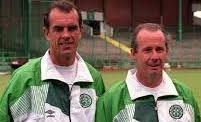
HAPPIER TIMES…Joe Jordan and Liam Brady at Parkhead.
Kevin Kelly, who had taken over from Jack McGinn as chairman, followed the party line. He was quoted, ‘Liam always conducted himself with great dignity as Celtic manager. He did the honourable thing by resigning.’
Rather needlessly, his statement added the board would consider as ‘a matter of urgency’ the question of a permanent replacement.
It was a heaven-sent opportunity for Fergus McCann, smelling blood in the boardroom battle, to have his say. The Scots-born Canadian millionaire didn’t hesitate to go into print. ‘Perhaps the board should accept their responsibility for the current situation and do the honourable thing. Perhaps changes should be made at the top. Some of the directors should look at themselves for a change.’
Brady had no intention of facing the media at a Press Conference. I was aware he didn’t have a lot of time for my fellow-hacks. He came off everyone’s radar as they frantically searched for his whereabouts.
I knew exactly where he was, but couldn’t say or write a word. As a Sunday newspaperman in these situations, you have got to hope your story remains exclusive until Saturday after the dailies had exhausted their sources in the pursuit of the awol Irishman. Even then, you have to make sure your Sunday rivals don’t get a sniff.
I had every confidence Brady would not speak to anyone else, even if there was big money on offer for a so-called scoop.
Before I could get round to putting that story into print, came another bombshell from Parkhead twenty-four hours later. Joe Jordan, who was expected to step up and take charge of the team, suddenly quit. Why? There’s been a fair amount of conjecture over the years.
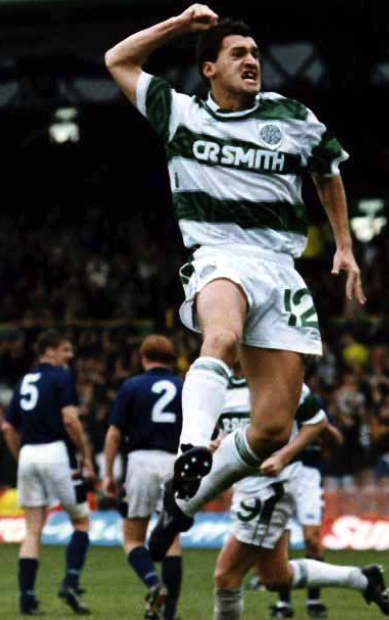
FAREWELL GIFT…Pat McGinlay celebrates his winner against Dundee at Parkhead.
There’s also been a fair amount of silence. It was obvious Jordan was extremely upset he wasn’t immediately awarded the job as Brady’s successor. My information at the time suggested the Celtic directors had already made an approach to Lou Macari, who was Stoke City’s manager, with the offer of the post at his former team.
If that was the case, the men who occupied the Celtic boardroom were displaying a remarkable level of ignorance or, if you want to be kind, naivety.
It was well known in football circles that Jordan and Macari were the best of pals, forging a friendship during their years as colleagues at Manchester United and also the Scotland international squad.
Undoubtedly, Macari would have contacted his mate about the situation. For me, that would have sparked the reaction from Jordan on the Friday when he walked out of Celtic Park for the last time. He left saying simply, ‘You’ve got to make these sort of calls.’
Coach Frank Connor, back at the club for a third time after being sacked as Davie Hay’s assistant in 1983, was catapulted into the dug-out for the weekend home game against Dundee which the club won 2-1 with a late goal from substitute Pat McGinlay.
A leaving present for Brady for making a dream come true?
* TOMORROW: Don’t miss the next riveting instalment of the Liam Brady story – only in your champion CQN.

